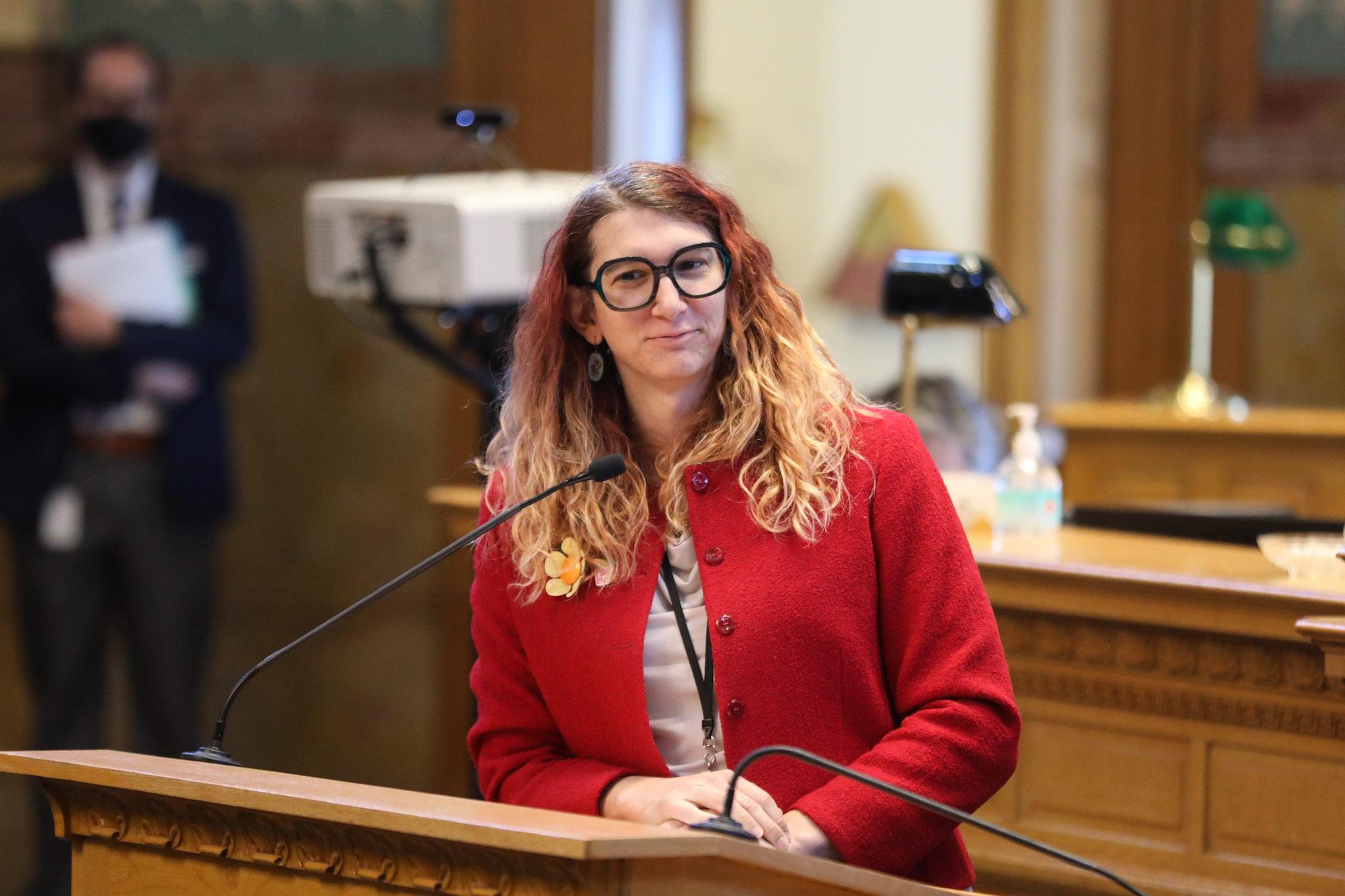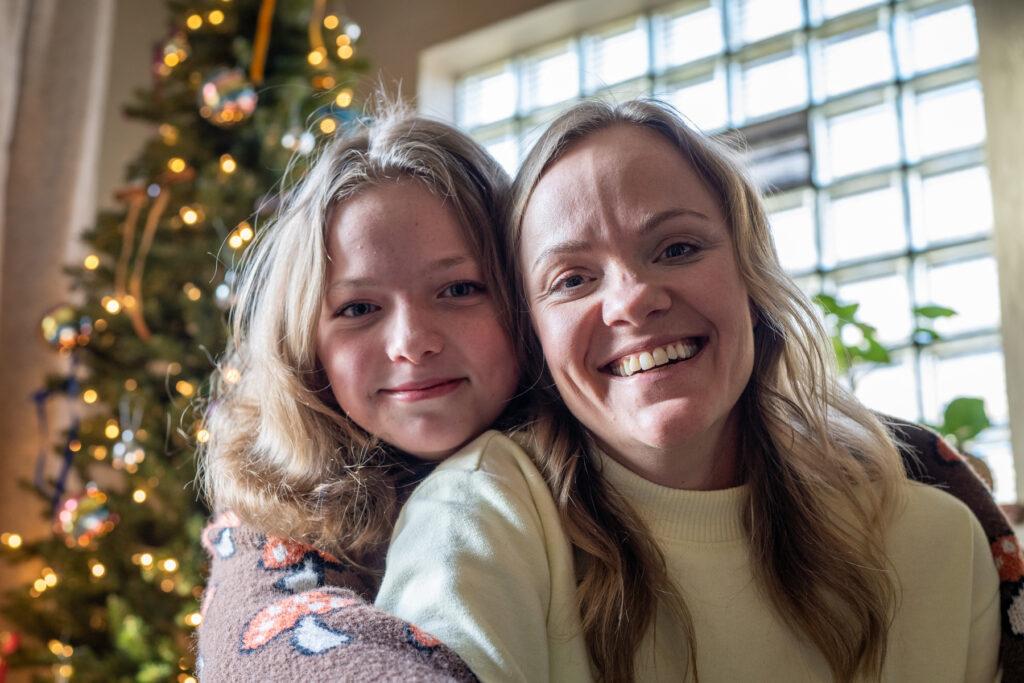
Hadley, 13
Liz Charles can pinpoint the exact moment she decided to move her daughter out of Oklahoma.
It was November 8, 2022. Election night.
Republican Gov. Kevin Stitt won reelection by a wide margin. During his first term, the incumbent signed several anti-transgender laws, including a ban on trans athletes playing female school sports. Throughout his campaign for a second term, he promised to sign more laws like it, including a ban on gender-affirming care for young people.
As a mom, Charles felt attacked. Her daughter, Hadley, 13, had come out as a trans girl a few years prior. Charles, along with Hadley’s dad and brother, were supportive of Hadley’s transition. She bought her new clothes and drove her to doctor’s appointments for puberty blockers.
For years, Charles protected her daughter against what she saw as an “agenda to erase transgender people” in Oklahoma, a place they called home for over a decade. She traveled to the State Capitol to lobby against half a dozen bills.
But after years of fighting, her energy faded. Most anti-trans laws passed easily through Oklahoma’s Republican-led legislature. Hadley’s mental health suffered after another student outed her at school. And after watching Stitt’s second term victory in her living room in Oklahoma City, something clicked.
"That was a very jarring moment of clarity for me. It was indicative of where the state was as a whole and it just was so clear that we had to leave.”
With that realization, Charles joined thousands of families with transgender kids whose lives have been upended by a national rise in anti-trans legislation. Roughly 1.4 percent of the U.S. population between 13 and 17 identifies as trans, according to a report from the Williams Institute, which is based on Centers for Disease Control and Prevention surveys.
In 2023, statehouses across the United States saw nearly 500 bills introduced that targeted lesbian, gay, bisexual, transgender and queer people, a record amount according to a tally from the American Civil Liberties Union. At least 75 have since been signed into law, with a majority chipping away at access to gender transition-related care for minors, bathroom choice in public schools and the ability to change gender markers on official documents, like birth certificates.
The swell has fueled interest among LGBTQ Americans in moving to states with more protections in health care and public education. According to a 2023 survey of transgender adults by Data for Progress, a progressive think tank, 41 percent of young trans adults from ages 18 to 24 have considered moving away from states with anti-trans laws.
Data on families with trans children are scarce. The Census Bureau doesn’t track migration by gender identity, according to a spokeswoman.
Families and advocates interviewed by CPR News said parents who want to move are resorting to online research to determine which states have LGBTQ-friendly laws in place. Many can’t leave due to the high costs and logistical hurdles of moving long distances from home.
Charles, a 37 year old non-profit employee, said she became an “armchair” researcher following the 2022 election, which led her to learn about legal protections recently passed in Colorado. She read that in April, Gov. Jared Polis had signed a bill into law that protects providers and patients from being targeted for prosecution by states that have banned gender-affirming care.
Charles proposed moving to Colorado to her family over dinner the night after election day.
“What do you think we should do about this dilemma that we’re in?” Charles asked Hadley.
“We still have a lot of family here,” Hadley remembers saying. “I have to really think about it.”
The two Googled gender-affirming care in Colorado, and found the website for the TRUE Center for Gender Diversity at Children’s Hospital Colorado in Aurora. That night, they put Hadley’s name on the waitlist for an appointment.
Charles started searching for work, and in August 2023, the mother and daughter moved into a small rental house in Denver.
“We were in a fight or flight situation,” Hadley said. “And we chose flight.”
Noah, 17
Noah, 17, never imagined finishing out his high school career in Denver, a place he’d never visited before July 2022.
He realized he was a boy when he was five years old while growing up in Houston, Texas. In the following years, with the support of his family, he came out as trans to his church and school friends.
“I just stuck with it,” he said. “I felt very comfortable being perceived as more masculine.”
At the start of high school, Noah met a partner. He started skateboarding. He dealt with some misgendering, but otherwise felt good about navigating his transition.
But as Texas politics shifted, so did his sense of safety. After state legislators passed a ban on trans students participation on sports teams in 2021, Noah noticed the climate around him grew more hostile towards trans people and their rights.
“I knew gender fluid people who were getting misgendered frequently. People who were supposed to be their friends literally screaming at them that they’re not a boy, they’re not a girl.”
His mom, Katie Laird, went to testify at the State Capitol against a second anti-trans sports bill. She was shocked at how much support it drew from other Texans.
“There were people in the hallway with signs talking about ‘No mutilation,’” Laird said. “I went back to my car and I cried.”
In February 2022, Texas Attorney General Ken Paxton issued a legal opinion defining certain gender-affirming health care for transgender kids as child abuse. Paxton also said the Texas Department of Family and Protective Services “has a responsibility to act accordingly.”
Supporters of anti-LGBTQ legislation, particularly bills targeting trans rights, claim the laws protect children from life-altering legal decisions and medical procedures. But advocates and major medical institutions, including the American Medical Association, label professional gender-affirming health care for minors, such as hormone therapy and puberty blockers, as “medically necessary” for many trans kids.
Laird feared what would happen if Noah injured himself skateboarding and had to go to the hospital. If someone realized he was trans, would they report the family to the state? And would they be investigated?
“There was no way that I was going to risk that as a mom,” Laird said.
Noah started skipping classes at school out of fear of being reported. He had regular anxiety attacks. In March 2022, Texas Children’s Hospital paused all gender-affirming care, which meant Noah had nowhere to go for hormones that helped him appear more masculine.
“That was it,” Laird said. “It was physically dangerous for him to be here.”
After considering Vermont and California – both too far – they picked Denver due to its relative proximity to Texas. Public school districts in Colorado also follow statewide anti-discrimination guidelines, which allow students to use bathrooms and locker rooms consistent with their gender identity.
The LGBTQ community was more visible, too. During their first visit, Noah and Laird played a game where they counted the Pride flags on homes. They lost track because there were so many.
“It just felt right,” Noah said.
After his family moved in July 2022, Noah started at a new school. Many of his classmates also identify as queer, and he feels comfortable relating to them. He’s already taking classes that count as college credit, and he hopes to study public health after graduation.
“Moving changed everything about our lives,” he said. “But I want to be happy, successful. And that's what I had to do. I had to leave to get here to do that.”

Rights and resources in Colorado
The increase in families moving to Colorado has put more demand on providers of gender-affirming health care.
The TRUE Center – the state’s largest provider of gender-affirming care for minors – has received an “unprecedented” number of referrals this year due to the closure of pediatric programs in many states, according to a spokeswoman. But then in July, the center abruptly stopped offering gender-affirming surgeries to adults because demand was too high.
“In order to continue delivering expert, multidisciplinary care to our pediatric patients and their families, we are focusing on behavioral, emotional and medical care for children,” the spokeswoman said.
Planned Parenthood of the Rocky Mountains, which doesn’t serve minors, has seen a 20 percent spike in patients seeking gender-affirming care over the past two years. Most out-of-state patients are from Wyoming, Texas and Arizona, said Fawn Bolak, the organization’s spokeswoman.
“We're starting to see patients uprooting their whole lives — breaking their leases and leaving their jobs — to move to safe states like Colorado, where their right to receive the care they need, without fear or judgment, is protected,” Bolak said.
Advocates and some Democratic lawmakers say the state needs to respond to the influx.
“We are maybe two or three steps behind [where we should be] as a sanctuary state,” said Nadine Bridges, executive director of One Colorado, a LGBTQ advocacy organization. “And I don't mean just in gender-affirming care or acceptance, I'm talking about housing and job security and all of the other pieces.”
Students from Colorado’s Youth Advisory Council recently proposed two bills to support trans rights. One would create a system to allow non-legal name changes in school for students 12 and older. Another would commission a study on the gender-affirming care landscape in Colorado.
Democratic Rep. Brianna Titone, who is trans, co-sponsored Colorado’s 2023 protections for gender-affirming care. She said she’s looking at other legislative actions in the upcoming session, including incentivizing the opening of more gender-affirming care clinics.
"When other states are doing the opposite, it's important to show people that there's places where you can be hopeful. The most difficult thing that I feel that's happening right now is that we're creating refugees within our own country."
After the move

For Hadley Charles, the move from Oklahoma to Denver made her feel like she could “breathe again.”
On her first day of seventh grade, she made a friend. Teachers asked students about their preferred pronouns.
When she would come home from school, she felt energized and creative. She started weaving and making crafts, including colorful friendship bracelets with her favorite things on them. A Taylor Swift song reference was in there, along with the word “slay.”
“I was in a really bad mental state in Oklahoma,” she said. “I feel so much better mentally.”
Now, she’s focused on spending time with her mom, doing homework and picking out her favorite pizza and ice cream shops. Charles said affirming doctors have helped Hadley’s transition continue.
“I can't overstate how healing that is,” Charles said.
But the transition to Colorado hasn’t been smooth for all.
Dallas, 15
When Brianna Hurley fled Texas with her 15-year-old son Dallas due to anti-trans legislation, she picked Aurora as a place to settle.
Shortly after the family arrived in Nov. 2022, they hit a few hurdles. The mass shooting at Club Q in Colorado Springs happened, which felt “way too close” to their new home, Hurley said. The nearby public library voted against a campaign to ban several books with LGBTQ themes. And a neighbor yelled a homophobic slur at Hurley’s husband when he came home wearing a pride shirt one day.
"Even within any supportive area, there are always going to be people who hate."
It took four months to get an appointment with a gender-affirming care provider, due to a long waitlist. Hurley still homeschools Dallas out of fear of bullying. For months after moving, they barely left the house. Now, they’ve started attending LGBTQ-friendly community clubs in Denver to make friends, Hurley said.
They enjoy driving around the city and looking at buildings. Dallas loves architecture and drawing. He even reconstructed an art deco style skyscraper on Champa Street in Minecraft.
Dallas is still working on his transition, and he feels empowered.
“Moving to Colorado has definitely made it easier due to more clinics being here,” he said. “And we don’t have to go into hiding.”
After Hurley read an article about paperwork being filed for a potential ballot measure seeking to ban gender-affirming care, she started attending local advocacy meetings with One Colorado and other groups. She feels called to defend the rights of Dallas and other trans kids that were lost in their home state.
"This is a thing we need to protect and make sure that it doesn't get worse. I feel like we’re fighting on higher ground here."








